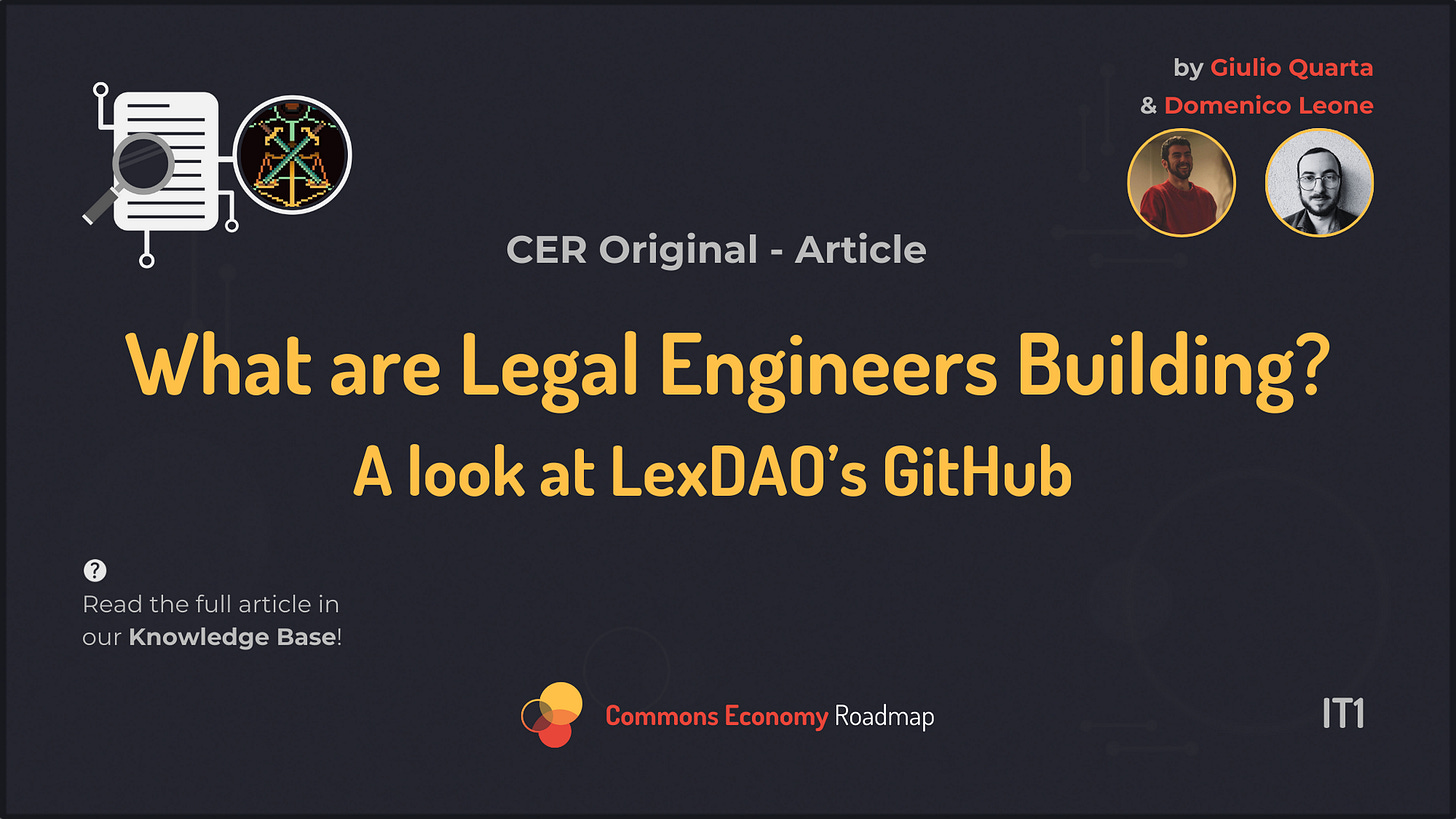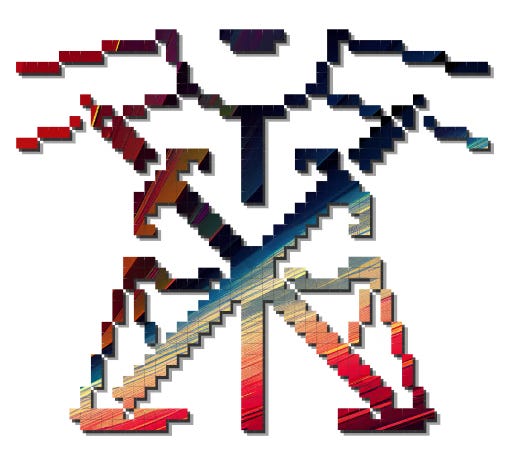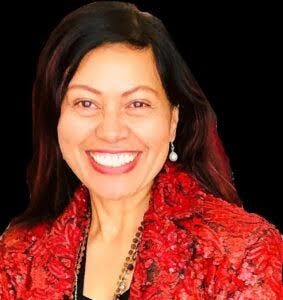LexNews+ Weekly No. 16
The Commons Economy Legal Engineering spotlight; Gensler in the hotseat; Robinhood buys Bitstamp for $200m; House members ask Potus to bring detained Binance employee home; and more.
Sections:
1. Headlines (The top stories in legal engineering and cryptolaw this week)
2. Podcasts
3. LexDAO weekly updates (Governance, Events, Membership, Study Group)
4. Closing Statements
Headlines
1. The Commons Economy publishes their Knowledge Element (KE) overview of LexDAO!
Read now Here.
We at LexDAO are thrilled to see our efforts recognized by Commons Economy in their comprehensive overview of our initiatives and impact in the field of legal engineering. Their article captures our mission to revolutionize the legal landscape through technology, open-source collaboration, and innovative legal solutions.
Legal Engineering: Our Core Focus
Legal engineering, the intersection of law and technology, is our domain. We strive to enhance legal processes, create smart contracts, automate workflows, and utilize data analytics to make legal systems more efficient, accessible, and transparent. Our ultimate goal is to simplify legal procedures for all.
Our Approach and Contributions
Commons Economy aptly highlights our diverse activities:
Research and Development: We are constantly pushing the boundaries of legal engineering through groundbreaking research.
Training Initiatives: Empowering the next generation of legal engineers is a key priority for us.
Advocacy for Open-Source Law: We believe in the power of open-source solutions to democratize access to legal tools.
Blockchain-Based Dispute Resolution: Our innovative approaches in this area are setting new standards for efficiency and fairness.
Our partnerships with educational institutions, nonprofits, and other stakeholders are vital in advancing public goods and providing consultancy in web3 development and decentralized organizational structures.
GitHub: Our Open-Source Hub
GitHub serves as our digital workshop and community space. The article rightly emphasizes its importance in our workflow, where transparency and collaboration are paramount. Key sections of our GitHub repository include:
LexDAO Constitution: The foundation of our values, mission, and governance structure.
Legal Engineers Roster: A directory of certified legal engineers committed to maintaining high standards in this emerging field.
LexCorpus: A repository of tools, code, and resources supporting the broader legal engineering ecosystem.
Highlighted Projects
Two of our standout projects featured in the article are:
Ricardian LLCs: These are groundbreaking business entities that exist on the blockchain, combining traditional LLC structures with the transparency and security of NFTs. This project showcases our commitment to making business formation and management more efficient and accessible.
LexLocker V2: Our decentralized escrow service facilitates secure transactions on Ethereum-compatible blockchains. By reducing reliance on intermediaries, LexLocker V2 speeds up transactions and lowers costs, although it requires users to have a good grasp of blockchain technology.
Collaborative Synergies
The article also notes our fruitful collaboration with Q Blockchain. Together, we are integrating Q's blockchain technology with our legal tools through platforms like KALI, aiming to provide streamlined, legally compliant frameworks for decentralized organizations.
2. SEC blunders are mounting up. What does it mean for cryptolaw?
Welcome to the hotseat: Gary Gensler (alternatively: “gg, GG?”)
In recent weeks, the U.S. Securities and Exchange Commission (SEC) has found itself under intense scrutiny and criticism, raising significant concerns about its consistency, transparency, and overall effectiveness in regulating the burgeoning cryptocurrency market. Key developments highlight a series of missteps that could have long-lasting implications for cryptolaw and the broader financial regulatory landscape.
The DEBT Box Crypto Lawsuit Fiasco
The SEC’s decision to shutter the office responsible for the failed DEBT Box crypto lawsuit has become emblematic of the agency's current struggles. The DEBT Box case, which aimed to crack down on alleged securities violations, ended in an embarrassing defeat for the SEC, prompting internal shake-ups and the closure of the office that handled the case. SEC lawyers Michael Welsh and Joseph Watkins resigned in April after a federal judge sanctioned them for committing a:
"gross abuse of power."
This incident has fueled further criticism regarding the SEC’s approach to cryptocurrency regulation and its readiness to engage with complex digital asset cases (Coindesk).
Inconsistencies in Leadership
Critics have pointed out that under Chairman Gary Gensler, the SEC has been anything but consistent in its stance on cryptocurrencies. Paul Grewal, Chief Legal Officer at Coinbase, has been vocal about the lack of a clear regulatory framework, describing Gensler’s approach as erratic and unpredictable. This inconsistency creates uncertainty for crypto businesses trying to navigate the regulatory environment, potentially stifling innovation and investment in the sector (Fox Business).
Legal Battles and Lack of Transparency
Adding to the SEC’s woes, the American Securities Association (ASA) has filed a lawsuit against the agency, alleging a lack of transparency in its enforcement actions. The ASA's legal action centers on the SEC’s record-keeping practices and its refusal to disclose information about ongoing investigations. This lawsuit follows another complaint filed by a trade association seeking details on the SEC's internal processes and decision-making criteria (Reuters) (Bitcoin.com) (ASA Complaint for Declaratory and Injunctive Relief).
3. Robinhood Acquires Bitstamp for $200M
🎶 “Robinhood and Little John walking through the forest, laughing back and forth as they’ve just bought a new exchange;” 🎶
Robinhood's recent acquisition of Bitstamp for $200 million marks a significant strategic move for the company, emphasizing its commitment to expanding its presence in the cryptocurrency market. This acquisition, announced last week, positions Robinhood to leverage Bitstamp’s extensive customer base and solid reputation across various global markets, including the EU, UK, US, and Asia (Robinhood Newsroom) (FinTech Futures).
Bitstamp, founded in 2011, is one of the world’s oldest and most reputable cryptocurrency exchanges, known for its high security standards and regulatory compliance. Integrating Bitstamp's platform and expertise into Robinhood’s ecosystem will enable Robinhood to offer enhanced trading experiences and broaden its appeal to both retail and institutional investors (Robinhood Newsroom) (Benzinga).
Given that Bitstamp operates under the recently implemented Markets in Crypto-Assets (MiCA) regulation in Europe, this acquisition could have significant regulatory implications for Robinhood. MiCA provides a comprehensive regulatory framework for crypto assets within the EU, aiming to ensure market integrity and consumer protection. This could offer Robinhood a more predictable regulatory environment in Europe, contrasting with the fragmented and often uncertain regulatory landscape in the US (Cointelegraph) (Cointelegraph).
4. House Members ask POTUS to bring home detained Binance employee, Tigran Gambaryan
A group of U.S. lawmakers has recently urged President Joe Biden to take immediate action to secure the release of Tigran Gambaryan, a Binance executive detained in Nigeria. Gambaryan, who heads Binance’s Financial Crime Compliance division, was detained in late February after traveling to Nigeria for discussions with government officials regarding compliance issues. He has since been charged with money laundering and tax evasion, charges that U.S. politicians describe as baseless and part of a coercion tactic by Nigerian authorities to extort Binance (International Business Times) (Cointelegraph) (The Daily Hodl) (Decrypt).
The situation has been dire, with reports indicating that Gambaryan has contracted malaria while in detention and has collapsed in court due to his deteriorating health. Despite a court order to transfer him to a private hospital for treatment, Nigerian authorities have not complied, exacerbating concerns for his well-being (International Business Times) (Cointelegraph) (markets.businessinsider.com).
In a letter addressed to President Biden, Secretary of State Antony Blinken, and Special Presidential Envoy for Hostage Affairs Roger D. Carstens, the lawmakers, led by House Foreign Affairs Committee Chair Michael McCaul, emphasized the urgent need to treat Gambaryan's case as a hostage situation. They highlighted his wrongful detention and the harsh conditions he faces, urging swift action to ensure his safety and return (International Business Times) (The Daily Hodl).
The letter represents the highest-profile effort to date to bring attention to Gambaryan's plight, reflecting growing concern among U.S. officials about the treatment of the Binance executive and the implications for international business dealings (Cointelegraph) (Decrypt).
Podcasts
Too tired to read, anon? We feel that. Try these instead:
LexDAO weekly:
USPTO Application Updates:
Trademarks vs Traditional Markets
@drllau
Matter Labs faced the wrath of not so shadowy supecoders after revealing they'd applied for registration of the letters "zK" roused the indignation of the crypto-community, including two of the original inventors, culminating in the signing of a public statement of objection. Submarine patenting refers to the Japanese claiming use of titanium for golf clubs (correctly) riding the declining cost curve to lock out a lucrative future market. Similarly submarine trademarks, especially in software, attempts to claim-jump rendered services (digital publications) outside the original class (downloadable software) where it would be rejected as merely descriptive. The original Lanham Act was to preserve competitors from falsifying the true origin of goods. Not by "... exploiting the legal system to annex a public good." to claim ".. entire technology they had no role in creating". Akin to retroPGF, trademark law is to protect the result of success, not a substitute for quasi-patent-like enclosure of language.
The recent LexDAO hackathon revealed the same issue with service firms attempting to squat the letters "DAO" when they are merely DAOs in name only (DINO). In the name of "lex automata, pro publica", the IP channel will be discussing future counter-measures.
Most Valued Mentor - Sophie Amat
The LexDAO hackathon recognised the volunteer efforts of Sophie Amat, who challenged @drllau in a blockchain governance debate. As ex-banker she took the valiant (if contentious) position that software coders who work in high-trust domains, such as DeFi or medical records, should be held to the same high standards as fiduciaries/trustees (Walchit school of thought). For those interested, @sourSummer7 and @shuuly have compared the Szaboan (code'slaw) & Zirfam (hum-in-loop), as well as Woodism (<trust, truth++) using analogies from a 70s sitcom. This is the point noted in the foreword penned by Creative Commons proponent Lawrence Lessig "Code is law ... but not all law is legal". We welcome other l'externs to chip in their opinions as regulators struggle to tame the wild wild east. And a special shoutout to industry supporter Armitage.xyz who are providing the sourceCRED analysis for our LexDAO repo.
The hackathon pushed up a few more names as recorded commits in the LexDAO repo.
Events
MCON
What?: Metacartel is hosting MCON III, “…a [three day] gathering of dynamic DAO Operators, Governerds, and Builder-Philosophers to reconnect to the vision and values of decentralization, and dive deep into innovative onchain experiments and the spiciest topics of Web3.”
More details to come very soon!!
When?: September 26 - 28th, 2024
Where? Detroit, MI
Who?: We are joining the event as co-organizers and sponsors, so any and all LexDAO members interested in attending should reach out today to get involved!
Law at the Limits Video Series (LexDAO at Eth Denver)
Catch up on all the action from our work on the ground in Eth Denver at the Law at the Limits event this past spring!
Membership
June 1 2024 - Prior Token Deprecation
Tertius
LexDAO's 2022-2023 Polygon "Cred" Token was officially sunset on June 1st 2024! Re-up your membership and get a membership token today!
If you do not already have one, go to https://lexdao.org/membership. The LexDAO membership token is a 365-day expiring erc-721 token on Polygon Mainnet (PoS).
You can self-mint your membership token today by following the link on our website, providing a little information about yourself, and paying 300 DAI on Polygon Mainnet (PoS) through Unlock Protocol. You may also purchase one with a credit card or with Google Pay or Apple Pay through Unlock. If you have any trouble or questions, please tag @deleted-role in the LexDAO membership channel. Additional payment methods forthcoming, but you may pay for membership by sending $300 of Eth, 300 DAI, 300 USDC, or 300 USDT to LexDAO's Eth Mainnet Treasury at:
0x5a741ab878Bb65f6AE5506455FB555eaf3094B3F
which resolves to joinlexdao.eth and email operator@lexdao.org for manual minting and confirmation of information and directory entry. Token sunsetting will involve the removal of discord roles and snapshot voting eligibility tied to the prior token.
Study Group
The Kleros Study Group session, held on June 3, 2024, brought together a diverse panel of experts to dissect the workings of Kleros, its implications, and its potential to reshape arbitration within the crypto space. The session, moderated by Paolo Maria Gangi, featured insights from Alexandre Perez, Inês Bragança Gaspar, Facundo Trotz, Stephen Palley, and Alex Stanescu. Perez, representing Kleros, provided a general overview of the decentralized dispute resolution protocol. He explained that Kleros operates on the Ethereum mainnet and other chains, leveraging smart contracts to enforce rulings. The protocol uses a system of jurors who stake the native PNK token to earn the right to adjudicate cases. These jurors are incentivized to vote coherently with the majority, aligning with the concept of Schelling points to ensure fair outcomes.
Inês Bragança Gaspar, a lawyer and former Kleros researcher, delved into the incentive mechanisms for jurors, emphasizing the importance of coherent voting and the financial stakes involved. She referenced research by Luis Bergola, which explored the potential biases in blockchain arbitration and the effectiveness of Kleros's incentive system.
Facundo Trotz, a lawyer and policy writer at Kleros, contrasted traditional arbitration with Kleros, highlighting the decentralized governance, crowd-sourced pool of jurors, and the flexibility of the Kleros procedure. He pointed out the cost and time efficiency of Kleros compared to traditional arbitration and the transparency afforded by blockchain technology.
Stephen Palley, a US dispute lawyer, offered a critical perspective on Kleros. He questioned the premise that financial incentives tied to majority voting could lead to accurate adjudication. Palley argued that human psychology and behavior are complex and may not align with game-theoretic assumptions. He suggested that better agreement design and the use of technology to prevent disputes might be more effective than recreating flawed systems.
Alex Stanescu, a European Union lawyer, provided a nuanced view, acknowledging the niche Kleros fills in on-chain dispute resolution. He introduced the concept of "proof of discretion," where crowd intelligence is used as a discretionary power in certain scenarios. Stanescu also touched upon the potential for AI to play a role in online dispute resolution systems.
The debate touched on the philosophical underpinnings of what constitutes truth and fairness in the context of decentralized justice. The panelists explored the strengths and limitations of Kleros, with discussions on transparency, the role of human emotion in disputes, and the potential integration of AI. As the session concluded, it was evident that while Kleros presents an innovative approach to dispute resolution, its reliance on crypto-economic mechanisms and the wisdom of the crowd remains a subject of debate. The conversation underscored the need for continued exploration and experimentation in the intersection of law and blockchain technology.
For those interested in delving deeper into the intricacies of Kleros and the broader implications for the future of arbitration, the session provided a wealth of insights and perspectives. The full transcript and related materials are available for further review, inviting ongoing dialogue and critical analysis of this emerging legal technology.
Presenters:
- Paulo Gangi (Moderator)
- Alexandre Perez (Kleros)
- Inês Bragança Gaspar (Lawyer, Former Kleros Researcher)
- Facundo Trotz (Lawyer, Policy Writer at Kleros)
- Stephen Palley (US Dispute Lawyer)
- Alexandru Stanescu (European Union Lawyer)
The session was a testament to LexDAO's commitment to fostering discussions on law as a public good, with a focus on the evolving landscape of legal engineering and decentralized justice systems.
Email address for further inquiries: info@lexdao.co
Closing Statements
Cimply (LexDAO Assistant Operator):
LexDAO is organized to form a club of legal engineering professionals, united to innovate and bring the traditional legal settlement layer to code, and coded agreements to the masses. We believe that everyone deserves access to justice provided in a quick and efficient manner. If legal services were easier to use, verify, and enforce, we could live in a fairer world. Distributed ledger technology offers solutions to many problems in the legal space.
Our mission is to research, develop and evangelize first-class legal methods and blockchain protocols that secure rules and promises with code rather than trust. We do this by training LexDAO-certified legal engineers and building LexDAO-certified blockchain applications. We strive to balance new deterministic tools with the equitable considerations of law to better serve citizens on a cooperative and nonprofit basis for the primary and mutual benefit of its members and common good.
Law is a public good.
██╗░░░░░███████╗██╗░░██╗██████╗░░█████╗░░█████╗░ ██║░░░░░██╔════╝╚██╗██╔╝██╔══██╗██╔══██╗██╔══██╗ ██║░░░░░█████╗░░░╚███╔╝░██║░░██║███████║██║░░██║ ██║░░░░░██╔══╝░░░██╔██╗░██║░░██║██╔══██║██║░░██║ ███████╗███████╗██╔╝╚██╗██████╔╝██║░░██║╚█████╔╝ ╚══════╝╚══════╝╚═╝░░╚═╝╚═════╝░╚═╝░░╚═╝░╚════╝░















